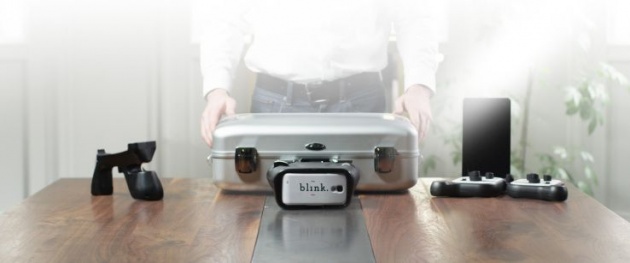
Anyone who has transitioned from blurry vision to the perfect pair of corrective lenses or glasses knows just what a blessing clear vision is. But going to get your vision tested can be time-consuming and annoying. And to make matters worse, optometrists spend about an hour per patient doing routine steps to collect information for a vision test when they could be helping patients with actual health issues.
Blink, a company formed out of the MIT Media Lab, is looking to change all that.
The company started with a 3D-printed smartphone add-on for measuring eyes for glasses, but the product has since evolved to provide all the service and equipment necessary to offer a full vision test, on demand.
Through the app and various pieces of equipment (all of which can fit into a tiny suitcase), Blink offers users the option to order a vision test direct to their home. According to the founders, the Blink option acts as a mobile substitute for $20,000 worth of immobile equipment used in an optometrist’s office.
A visioneer (as they call it) visits the house, sets up a little eye chart on a wall, and starts asking a few basic questions about your current prescription, how often you wear glasses or contacts, and if you have any history of health problems with your eyes. Then, with the help of a tablet app and a view-finder device, the user takes a series of easy tests that measure vision.
The device is called the Netra, and aside from the smartphone used as a display, the whole thing is mechanical so that it doesn’t ever run out of battery. It is highly reminiscent of the Samsung Gear VR, but instead of virtual reality games, the software is all about testing your vision. The visioneer then pairs the information garnered from the tests with data gathered from the user’s ability to read the eye chart.
From there, the visioneer moves on to a new device called the Netropter, which lets you try out the suggested prescription by reading the eye chart again, replacing the painful process of deciding between “one or two, two or three, one or three?” as you would at the eye doctor’s office.
Blink is very clear about the fact that this is not a substitution for an optometrist visit, but rather an easier way to get a glasses prescription.
“It’s a vision test,” said founder David Schafran. “It’s not a check-up.”
From there, Blink sends all the gathered information from the test to optometrists that the company has partnered with, who then spend about ten minutes analyzing the data and writing out a prescription. The prescription is then sent to the user via email and can be used to buy a new pair of glasses — the company is working on a solution to measure for contact lens prescriptions.
For every vision test Blink performs, the company gives a vision test and a free pair of glasses to someone who is in need locally.
It costs $75 to do a vision test, but if you get a few friends or co-workers together, the price per person goes down based on the number of tests a Visioneer gives in a single visit.









